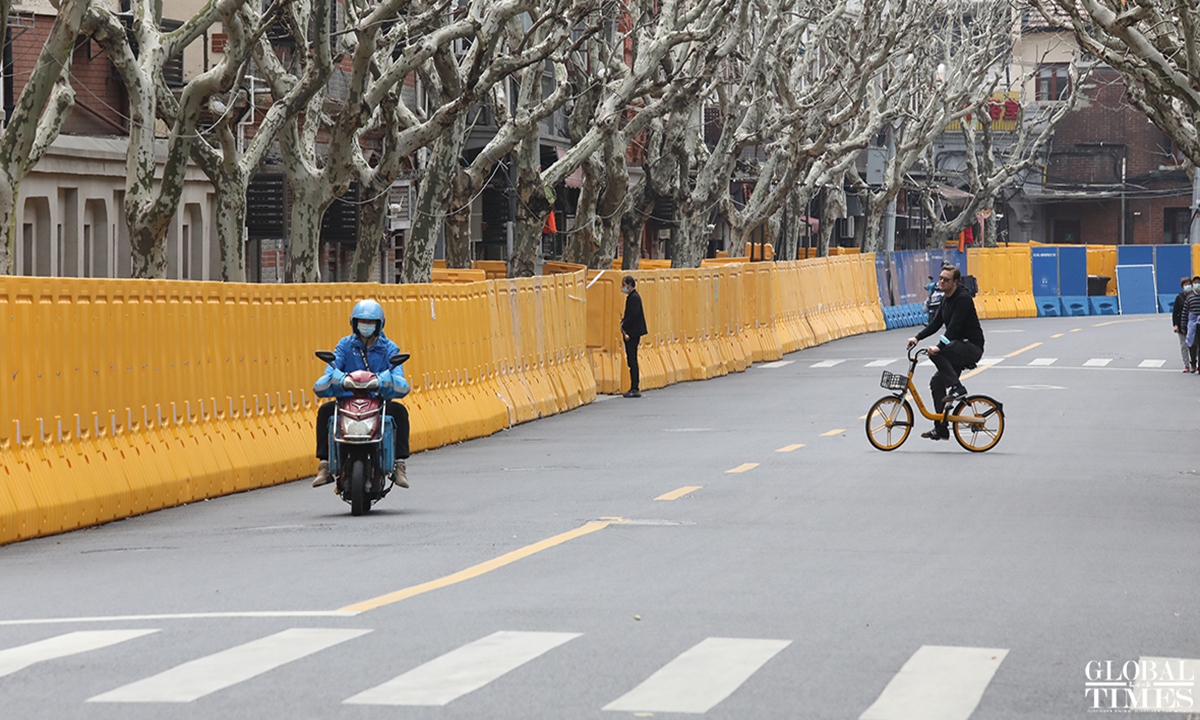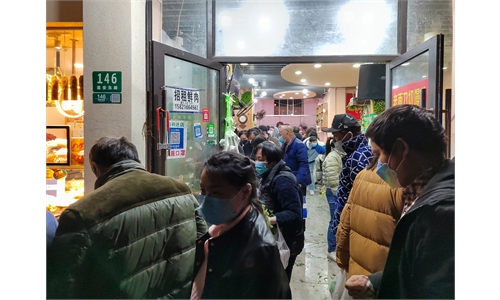
On Kangding road, Jing'an district of Shanghai, street barriers are placed to manage traffic outside the neighborhood communities. Some residents were jogging, while sanitation workers were busy collecting garbage.Photo: Hu Gong
The Shanghai port and semiconductor factories in the city continue to operate ensuring smooth transport of anti-epidemic materials and the global supply chain after Shanghai announced a massive testing, splitting the city in two roughly along the Huangpu River. The current outbreak could cut the city’s GDP growth by 0.5 percent, economist have speculated.
During the mass testing period, airports, railways and international passenger and freight transport will operate as normal, the municipal government has confirmed on Monday.
Shanghai port is still operating around the clock, to ensure operation and smooth transport of anti-epidemic materials and other essential items, according to a statement issued by the group on Monday.
The current container throughput of Shanghai port remains at about 140,000 Twenty-foot equivalent units (TEU) with work continuing at a rapid pace, according to Zhou Yong, an Assistant General Manager of the production department of Shanghai International Port Group on Monday.
A representative from a Shanghai container transport company also confirmed that the container transportation to other cities remained operational.
“Cargo truck drivers within the blocked area need to provide their order and negative nucleic acid results issued within 48 hours to gain access to the port area,” the representative said.
However, in spite of efforts to ensure normalcy, quarantine measure may have an impact on the efficiency of the operation of the port and logistic, experts have claimed.
Zheng Jingwen, a research fellow with Shanghai International Shipping Institute said that the Shanghai port is still operating, though the efficiency is likely to be reduced due to shortage of labor and quarantine requirements.
“The level of congestion is relatively serious,” Zheng told the Global Times on Monday.
An employee from a Shanghai based logistic company surnamed He also confirmed that some ocean freight had been shifted to early April.
“The arranged ship scheduled to leave for Japan and Thailand on Tuesday have been put off to April 8,” He said, noting that the company is still taking orders and busily engaged in the preparation before the ship sets sail.
Separately, large Shanghai-based manufacturing companies including Chinese chipmaker Semiconductor Manufacturing International Corp,Hua Hong Semiconductor has also announced they were continuing to operate while complying with strict Covid prevention measures.
Tesla meanwhile suspended production Monday, with operations to be halted for four days, according to media reports.
Tesla told the Global Times on Monday that is implementing the epidemic prevention and control measures and will arrange a new work schedule according to local government's policies.
“We believe in Shanghai's speed and strength. Today’s fight move against the epidemic has laid a solid foundation for better and faster development,” Tesla said in a statement sent to the Global Times on Monday.
The omicron surge in Shanghai could cut the city’s quarterly GDP growth by 0.5 percent compared to a year ago, Cao Heping, an economist at Peking University, told the Global Times on Monday.
He noted that the epidemic will put liquidity pressure on the secondary industry of the city and with a limited impact on the service industry.
“Many companies in the service industries have been used to the online model and will find a way out with the experience gained in the past two years,” Cao said.
The epidemic will certainly have an impact on the city’s economy however under China's 'dynamic' zero-COVID strategy, the model adopted by Shanghai also reflected an attempt and exploration to minimize the impact of the epidemic on the economy, Bai Ming, deputy director of the Chinese Ministry of Commerce's International Market Research Institute, told the Global Times on Monday.
“The Shanghai method might have an impact on internal operation of firms in the city with separate industrial chain across the river however it is also a way to keep the city running and striking a balance between economic activity and fighting the virus,” Bai noted.

